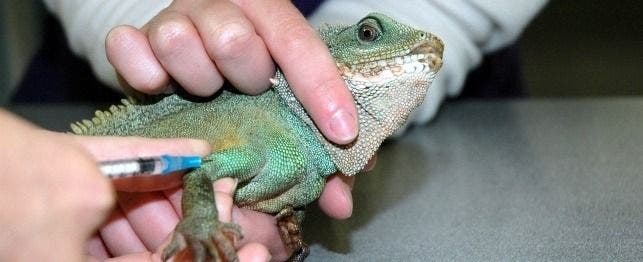
The Iceberg Principle: Your Reptile May Be Sicker Than You Think
The phrase “tip of the iceberg”– meaning that far more lurks out of sight than can be seen in plain view – isn’t an idle expression. Typically only one-seventh or one-eighth of the mass of an iceberg extends above the surface of the water where it can be seen; the rest floats hidden below the surface of the sea.
With this in mind, remember that what you may be observing in your reptile might be just the “tip of the iceberg,” with most of his symptoms hidden beneath the surface. Because reptiles are cold-blooded, they are able to conserve energy and maintain body functions for a long period of time, longer than other warm-blooded animals, and by the time even the most experienced keeper suspects illness, there is a very good chance that the animal is more ill and has been sick for longer than either owner or veterinarian can know. This is not the fault of either; it is simply a reflection of the evolution of reptiles, which has made them masters at hiding disease.
Even very small things that are wrong or just slightly off can, over time, lead to big health problems. Stress onset can be sudden and acute, such as a new owner or a new cage mate. Or it can be slow and insidious like improper temperature or insufficient hiding places. Sudden onsets bring about immediate and dramatic changes in color and behavior that even the only moderately observant owner can pick up on. Slow, constant stress, however, may result in slow, gradual changes in behavior and color. Behaviors such as thermoregulating, hiding, prolonged soaking, reduced appetite, irregular defecation, attitude, regression/increase in tameness, and more can all indicate signs of stress and illness.
It is important that you get to know your species as thoroughly as you can, through publications and clubs and your veterinarian, and that you maintain records to help you to assess your pet’s health objectively. But keep in mind that there is no substitute for careful and regular observation of your pet. If your instincts tell you that his behavior has changed, or if your records show a trend that you cannot explain, don’t wait for overt signs of illness before consulting a veterinarian. Regular well-pet examinations will build a good relationship with your reptile veterinarian and expand your knowledge of reptile health and husbandry. Building your knowledge of your pet in health is the surest way to prevention and early detection of disease.
Signs
There are some signs that you may notice that require a trip to your veterinarian:
- Trauma such as broken tails, bite or scratch wounds or burns. Open wounds can rapidly become infected, leading to septicemia (blood poisoning). Cat bites, and those from other reptiles, can be particularly dangerous. Do not underestimate the level of aggression that can exist between reptiles; few species should be housed together and in many cases it is inappropriate to house together individuals of the same species.
- Swollen or shortened lower jaw
- Swollen or lumpy limbs
- Muscle tremors
- Reluctance to move
- Paralysis
- Abnormal gait or lameness; uncharacteristic slithering in snakes
- Abnormal posture, e.g. “star gazing” in snakes
- Seizures
- Parasites: internal and external – these are a common and unnecessary burden on your pet
- Changes in stool or urine production, color, consistency or regularity
- Lack of appetite or anorexia
- Vomiting or regurgitation
- Skin lesions: sores, swellings, moist areas that should be dry, soft areas that should be hard
- Eye or nose discharge
- Changes in respiration: open mouth breathing or labored breathing, characterized by an extended head and neck, and in the case of snakes, resting the head against the tank wall; whistles or wheezes as the animal breathes; foam in the mouth
- Weight loss
- Changes in behavior such as unusual docility or aggression.
For more information on how to tell if your reptile is sick, please see the following: What is Normal and When Your Reptile Behavior is Abnormal.